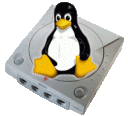Release Notes
Lxdream 0.9.1 is mostly a performance release (core emulation is a good 33-50% faster, although rendering performance is still bad), with a few new features like VMU and LIRC support. As for 0.9, the majority of software can be expected to "just work" with minimal problems.
Nevertheless this should still be considered an alpha release, with many unimplemented features remaining. You're unlikely to see 'perfect' emulation, and we're nowhere near being bug-compatible (in other words, don't expect your code to work on the real hardware just because it runs correctly in lxdream).
Changes since 0.9
- Lots of core performance improvements, especially with the MMU turned on
- VMU support (memory card only)
- GDB remote debugging support
- Quick-save states
- LIRC driver
- Now uses the ~/.lxdream directory (by default) to store runtime data
- Audio + input drivers are now built as plugins
- OSX: fullscreen support, minor UI improvements
Known issues
The following are known problems in 0.9 that will be fixed in the next major release - in other words, you don't need to report them - we already know :)
- Graphic artifacts related to translucent triangle intersections, sorting errors and/of lack of depth precision.
- MMU address translation (eg linux, wince, etc) is painfully slow to the point of unusability.
- Rendering performance ranges from barely acceptable to abominable.
- The SH4 emulation is not cycle accurate, and (by default) usually runs slower than the real one. This cause some programs to have timing problems or to break completely. In some cases this can be worked around by adjusting the CPU scaling factor (-m command line option)
- Audio quality generally ranges from poor to horrible, interrupted by the occasional bit of fair-to-middling sound.
System requirements
Linux:- GTK 2.6+
- Current (2008 or later) ATI or NVidia binary OpenGL drivers
- If anyone wants to fix the free drivers, lxdream specifically requires a working implementation of either the EXT_framebuffer_object or GLX_SGIX_pbuffer extensions.
- System 10.4 or later
The current version has only been tested under Linux and OS X, but it should be able to be built without too much trouble on any reasonably modern BSD as well. However non-x86 platforms are not supported at this point (there are known endianness issues).
Building
From the base directory~$ ./configure ~$ make ~$ make install (optional)
Older History
Changes since 0.8.4
- Improved accuracy + compatibility (many bugfixes)
- Shadow volumes
- Render-to-texture support
- Fogging
- Light-gun support
Changes since 0.8.3
- Fullly native Mac OS X support
- Renderer rewrite (fixes perspective correction among other problems)
- ALSA and PulseAudio sound drivers
- Save states now work on x86-64
- New translations: Spanish and Italian
- Lots of miscellaneous bug-fixes and improvements
Changes since 0.8.2
- MMU Implementation
- Dreamcast mouse + keyboard support
- Joystick/gamepad support
- Assorted bug-fixes
Changes since 0.8.1
- x86-64 architecture support
- Basic Mac OS X support
- Pbuffer support to work with GL drivers without EXT_framebuffer_object
- Support for more recent CDI and NRG image file versions
- Minor bugfixes
Changes since 0.8
- Minor configure and portability fixes
- Added GDI support
- Implemented full screen mode.
Changes since Milestone 3
- Speed improvements (translation core now runs at roughly double the speed of M3)
- GUI Overhaul - it's actually somewhat usable now. Also removed the gnome dependency (now just needs GTK 2.0)
- Sound fixes (aka, some sound actually works now)
- A few minor bugfixes and tweaks.
Changes since Milestone 2
- Implemented the SH4 translation core
- A handful of minor bugfixes
No really, that's it. The good stuff is coming next version, honest
Changes since Milestone 1
- Complete rewrite of nearly all PowerVR2 code - The M1 code was largely a quick hack to get something running. It's done for real now.
- Initial IO event system (not widely used yet)
- Lots of bugfixes throughout the system
 lxdream 0.9.1
lxdream 0.9.1